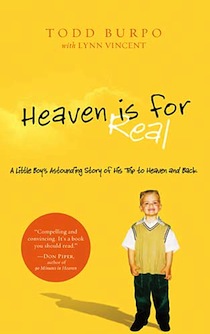Seeing Truth Reflections In Light Of Scripture
 Does appreciating God’s truth echoed elsewhere mean I dishonor His written Word?
Does appreciating God’s truth echoed elsewhere mean I dishonor His written Word?
If I enjoy the beauty of a sunset, am I questioning the sufficiency of Scripture?
When listening to what I believe is the world’s most amazing music, The Lord of the Rings film score, am I acting as if God hasn’t given me enough in the Bible for faith and practice?
And (this is a direct followup from last week’s column) if I look back on something in my life, perhaps what I believe could have been a subconscious push from Him to try this, go here, pray for that person, and think, Was that God personally guiding me? — am I then rejecting my Creator’s final, inerrant and ultimate revelation in favor of some new revelation?
I will give away the ending by answering no to all four questions. I don’t believe these beliefs automatically mean we reject God’s Word or act like we desire newer and shinier truths.
Instead we can love all these, not in place of God’s Word, but because they reflect its light.
God’s personal guidance: best seen in retrospect?
Last week I wrote about some Christians who either think too highly of their own writing as if it’s God-inspired, or else feel constrained to do nothing unless they receive some sign from God that they’re meant to make some decision.
That brought much discussion, mostly with my friend and co-blogger Becky, about whether Christians can trust God to guide them nowadays in ways like promptings or even miracles.
My guess: though I did mention Christians who expect some kind of guidance before making decisions about extra-Biblical matters — who specifically to marry, what job to choose and such — I didn’t make it clear that yes, I believe we can look back at our lives and see where God was working, and even how His Spirit has sovereignly guided us.
Yet that personal guidance is best seen after the fact — when time has passed, or perhaps that very strong impulse has actually come true and we can see the God-glorifying results.
One also can’t rule out the Biblical gift of prophecy. That’s a subject of much debate, which I don’t mind taking up another time, but in short: it’s very difficult to prove Biblically that certain gifts of the Spirit in the New Testament — not just mentioned, but endorsed — have suddenly expired now that the Bible is finished. “[W]hen the perfect comes, the partial will pass away” (1 Cor. 13:10) isn’t talking about the Bible coming and certain gifts drying up — and anyone who does want to honor Scripture would want to read that in better context!
Spiritual gifts include prophecy, which Paul says in 1 Cor. 14:5 is even better than “speaking in tongues” (which I’m not touching here). But what is this kind of prophecy? It’s not using an inner spiritual-warfare Geiger counter or forecasting the future. Instead it is speaking “to people for their upbuilding and encouragement and consolation” (1 Cor. 14:3). So this kind of prophecy is done in a church, with testing (1 Cor. 14: 29-33), for the body’s building-up.
Is that contrary to the truth that Scripture is sufficient? Not if we take the word of Scripture itself — and not when any “prophecy” given in church points back to Scripture anyway.
This is similar to other ways God “speaks” to us. And though I think we must be careful with our language if we say “God told me” to do such-and-such, so as not to confuse it with how God revealed His Word, we must not overreact if someone believes God pointed back to His Word’s light with a reflection. Even if that’s an amazing story.
An over-reflexive reaction?
Frequent attacks on Scripture’s sufficiency come from all directions: be it faith-revisionist popular authors, or true Christians who claim they value the Bible, but actually put more trust in other things: personal promptings, showmanship, or God’s good gifts. With all those attacks, many Christians are eager to defend Scripture as the only Word “breathed out by God and profitable for teaching, for reproof, for correction, and for training in righteousness, that the man of God may be competent, equipped for every good work” (2 Tim. 3: 16-17).
But some Christians overdo their reaction. We need not act as if everyone who enjoys a truth reflection in a work of art, natural wonder, song or even apparent “prophecy” in church is thus rejecting the only sure Source of truth in the way He’s chosen to reveal it: His Word.

Recently a certain book has brought many critics replying with “Scripture is sufficient!” The book is about a little boy who was undergoing surgery, and later said he’d been temporarily transported to Heaven (the present-day “intermediate” Heaven; alas, the book does not talk as much about the more-incredible future New Heavens and New Earth — Rev. 21). Some criticism of accounts like this could be justified, especially if the tale includes anti-Biblical details about Heaven, and if some readers value the word of a person above God’s Word that already assures us that Heaven is for real (and New Earth will be even better). But I do see some overreactions: Scripture is sufficient! So we have no use for any stuff like this!
In response to this kind of criticism of any quasi-miraculous account, an online friend noted:
[I]n the deserts of our life, we find strength by clinging to God and God’s Word alone, but that doesn’t mean that’s how He “normally” plans for us to live… He gives us many other things to enjoy and to strengthen our faith.
That’s exactly why reflexive, inadequately-thought-out defenses of “Scripture is sufficient!” don’t apply in these cases.
Yes, Scripture is our final and ultimate standard, the way God has chosen to reveal His surest Word. Christians should love that, and we can’t say that enough.
But it’s not Biblical to discount any means we see God using other ways to reflect the light of His Word, such as in natural wonders, works of art, retrospectively seeing His sovereignty in our lives, or enjoying awesome stories honoring His truth.
Moreover, few who overdo those arguments that Scripture-is-sufficient (in narrowly, wrongly defined ways) will object to things like local-church membership, preaching, right theology applied to life, or even new worship songs, or many other things Scripture itself prescribes! Similarly, we could conclude we don’t need book reviews even of actual bad books because “Scripture is sufficient”!
Echoing the Word
I once heard a guy on the radio slamming a catalog he had received that advertised costumes and other equipment for worship dance in church. The host didn’t claim it was unnecessary and silly to have a “Christian items” catalog (which could be a more substantive charge). Instead off he went into a true but misapplied rebuttal based on Scripture is sufficient!
He then went on to rant about how Christians simply don’t need performances, dancing, smoke machines, motorcycles, radio — “Oh wait!” he said with a laugh (paraphrasing). “That was a slip of the tongue. I meant ‘rodeo.’ We don’t need rodeo. But radio is okay.”
This host was, after all, on the radio himself. But notwithstanding the question of whether rodeo is okay in church, why is radio okay and rodeo wrong? To be consistent, shouldn’t we dismiss both because “Scripture is sufficient”? But no one really applies this narrow and wrong view consistently. Nor can one really apply it that way.
And no one should. God’s Word is indeed amazing and sufficient — nothing, not even a good gift from God, should be seen as a greater revelation for us about Who He is, what He has done for His people and what He will do. Yet God is also good enough to permit His Word’s light to reflect in other ways — natural wonders, beauties even in a fallen world, and in the creations of man either meant to glorify Him specifically or simply showcase true beauty. He is also good enough to allow us to look back on our lives and see how He was guiding us, whether we wondered at the time if He was, or never saw His subtle sovereignty coming.
And as someone who wants to love any good gift for the sake of Himself, I rejoice in that!
What about you? What reflections of His Word’s light do you love seeing?










































Church history itself is a strong reflection of the Word’s light. That scarlet thread through time gives us comfort and support in our beliefs, not to mention an amazement in the providence of God.
I think you should be specific about WHAT radio program that ridiculously unbiblical slam against everything-but-scripture-and-his-radio-show was aired on. That particular show is being advertised as a wonderful alternative to news radio on a popular radio talk show, and ought to be shown up as what it is…an embarrassment to proper hermeneutics and bad preaching.
(Thought about that, but so far I haven’t been able to confirm whether that was a fluke or a continuing eyebrow-raising issue with that particular radio program.)
Disclosure: some weeks later, I accidentally hit the thumbs-up on my own comment, just above. 😀
The problem with the “Scripture is sufficient” line is that it doesn’t state what it is sufficient for. The Bible does not pretend to be a complete handbook of science or a how-to-write-a-novel text. It is sufficient for what it intends, however, and nothing should supplant it or be added to it.
As you said in your last comment to last week’s post, Stephen, we agree in far more than we disagree. I took issue (and still do) with the idea that we cannot know what God wants us to do here and now, today — that we can only know what His specific will for individuals was after the fact. I find that 1) too restrictive of God; and 2) too presumptuous that we can think we know how He works will all people because of how He works with us.
It reminds me of Peter walking with the resurrected Christ and seeing John following. What about him, he asked. And Christ said, essentially, None of your business. My plans for him are my plans for him. You take care of what I’ve told you.
Should we wait around for a “word” from God? Sometimes — if He’s told us to wait. But who’s to say if He has or not? That’s between Him and the individual Christian.
Should we say to one another, You should wait, or go, or write, or publish. I don’t think so. I agree that this is not Biblical prophecy. I doubt seriously that God tells one person what another should do. It isn’t the way He worked in the Bible, apart from prophets telling people to repent.
Even when the prophet confronted Paul and tried to dissuade him from going to Jerusalem because he’d be incarcerated, it appears that God told Paul what He wanted him to do even as He prepared the church by revealing what was to be.
Should we writers tell others we are called to write? There’s the question. I actually don’t like the fact that I’ve gone public with this because I don’t think it’s a matter for anyone else. I don’t think God calling me tells another single person on this earth anything. It’s between Him and me. I’ve shared it with friends before because it is a high motivation and because I’ve needed prayer to be obedient.
I feel passionate about this call, but I feel just as passionately that I don’t know what God will do with what I write. Perhaps He calls others to publish. That’s between them and God, and yes, I would expect Him to verify that call by also calling a publisher to publish the work. He can do that surely.
But I think it is so wrong for an author to deduce that God’s call to write a piece gives that individual a license to by-pass the normal avenues to publication, to dictate to agents or editors, to be rude, judgmental, demanding, or any of the other things we’ve all heard about. Those things, I believe, say most loudly, this person isn’t hearing everything God has said — the stuff, for example, that’s in black and white!
Becky
Heh. The radio host situation reminds me of something a girl who listens to Way of the Master told me about. Evidently Point of Grace had a song out a couple years ago (I could find the lyrics, but I’d have to hunt for it) with an admittedly odd (meaning somewhat silly) chorus. The thing is, the Way of the Master guys were mocking PoG for the song. I admit it was an odd choice of chorus. I find the hosts’ comments highly inappropriate, especially given they’re now guilty of mocking sisters in Christ. Scripture has plenty to say about that. And either way, why fault an artist for deciding to write and record a song just for the fun of it?
Anyway. I’ll come back when I remember the rest of what I intended to say…. 0=)
Edit: Ah, here’s a link to the song lyrics. And my friend was wrong; the part they were mocking isn’t even the chorus as claimed. http://tinyurl.com/5sr8avl